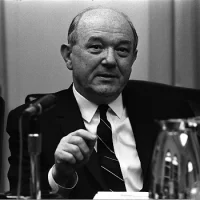For Russians, it was yet another dramatic confrontation which played out in the streets of Moscow, one which marked the growing frustration many people had with their elected President. The constitutional crisis of 1993 was a political stand-off between Russian President Boris Yeltsin and the Russian Parliament that was resolved by military force. The relations… Read More "Yeltsin Under Siege — The October 1993 Constitutional Crisis"
“The State Department has always been a whipping boy”
Charles “Chip” Bohlen (August 30, 1904 – January 1, 1974) served in the Foreign Service from 1929 to 1969 and succeeded George Kennan as Ambassador to the Soviet Union (1953–1957). He later served as Ambassador to the Philippines (1957–1959), and to France (1962–1968) and was one of the nonpartisan foreign policy advisors known as “The…
The Embassy Moscow Fire of 1977
Diplomats working in the USSR had to contend with a wide range of difficulties – poor bilateral relations, KGB surveillance, tough living conditions, Russian winters. For those serving in 1977, you could add one more thing to that list – a massive fire. On the evening of August 26th, U.S. Embassy Moscow erupted in flames.… Read More "The Embassy Moscow Fire of 1977"
End of an Era: The August Coup and the Final Days of the Soviet Union
In August 1991, Soviet hardliners attempted to overthrow the progressive Mikhail Gorbachev, Secretary General of the Communist Party, in a desperate attempt to save the collapsing Soviet Union. Declaring a state of emergency, eight government officials named themselves the State Committee on the State of Emergency (GKChP) and forcibly detained Gorbachev in the Crimea, where… Read More "End of an Era: The August Coup and the Final Days of the Soviet Union"
The Berlin Wall Is Built — August 13, 1961
On August 13, 1961, Berlin woke up to a shock: the East German Army had begun construction on the infamous Berlin Wall. The Wall was initially constructed in the middle of Berlin, and expanded over the following months. It entirely cut off West Berlin from the surrounding East Germany, prohibiting East Germans to pass into… Read More "The Berlin Wall Is Built — August 13, 1961"
The Paris Peace Conference — 1946
At the Paris Peace Conference, which lasted from July to October 1946, negotiators from the United States, Soviet Union, United Kingdom, France, and other Allied powers agreed upon the provisions of the Paris Peace Treaties, signed in February 1947 with Italy, Romania, Hungary, Bulgaria, and Finland. These agreements included monetary reparations, territorial adjustments, and political… Read More "The Paris Peace Conference — 1946"
Former Russian FM: “We need each other now more than ever”
In the wake of the terrible tragedy of Malaysian flight 17, which was shot down over Ukraine on July 17, a former Russian Foreign Minister contends that Russia and the United States need to have the presence of mind to look beyond short-term tactical victories and defeats and consider the long-term consequences for the wider…
Dean Rusk served as Secretary of State for eight controversial years, from 1961 through 1969, when public discomfort over his daughter’s interracial marriage prompted him to offer his resignation. (LBJ refused to accept it.) He ended up serving through the end of Johnson’s term. Born February 9, 1909, David Dean Rusk spent his early years…
Caught in a Honeypot – Marine Clayton Lonetree Betrays His Country
Marine Security Guard Clayton Lonetree was seduced by a Russian woman, “Violetta Seina,” at the annual Marine Corps Ball in November 1985. She worked as a telephone operator and translator for Embassy Moscow but lived a double life as a KGB agent. Lonetree was so highly regarded that he was chosen to be part of… Read More "Caught in a Honeypot – Marine Clayton Lonetree Betrays His Country"
Remembering Pope John Paul II
John Paul II was one of the most charismatic popes in recent history, a rock star who attracted millions during his frequent trips abroad and who was considered a beacon of hope for people in his native Poland. Born Karol Joseph Wojtyła on May 18, 1920 in Wadowice in southern Poland, he was elected pope… Read More "Remembering Pope John Paul II"

